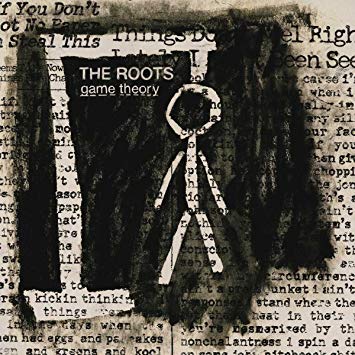ILLADELPH: LEGENDARY ROOTS CREW – 2006 Game Theory Feature (B.Getz on JamBase)
It’s been a whirlwind year for Philadelphia’s legendary crew The Roots. The band has reached a crossroads in their career, which spans over fifteen years, six albums, several changes amongst auxiliary members, and countless collaborations, movie soundtrack contributions, remixes, etc. Yet in the last fifteen months, the band has nearly splintered, switched major record labels, played two high-profile, star-studded shows at Radio City Music Hall, and recorded a new album. Not to mention the aftermath of Hurricane Katrina, the reemergence of a seminal member, and the death of two close friends and collaborators. The new record, Game Theory, is their first for Def Jam Records.Def Jam is a company that has experienced quite a transitional year itself, diversifying their roster, and most notably, installing Jay-Z as President. Leaving longtime home MCA/Geffen records was a precarious situation for The Roots, mostly due to the fact that the group has never experienced the mega-Soundscan success many of their peers have enjoyed. The Roots audience is not the radio hip-hop fan; he or she falls somewhere between true-school hip-hop heads, college radio listeners, and other (read: White) demographics. In a bold move, new Def Jam chief Jay-Z offered the band a deal to record for the flagship label. Def Jam is certainly the royal rap record company, originally founded by Russell Simmons and Rick Rubin, and is responsible for classic records from Beastie Boys, LL Cool J, and Run DMC, as well as many others. For The Roots to now be associated with this company, and the “Mike Jordan of this rap game” H.O.V.A., has validated the band and put them in the best position to further imprint their unique brand of hip-hop on the masses.
Gone with the major label was most of the group’s budget, much of which was used to secure time and staff in top-flight recording studios and to bring in some of the freshest virtuoso session players, collaborators, and producers. Drummer/band spokesperson Ahmir ?uestlove Thompson recently remarked that he had truly realized their dire situation when he went from having run of the grand Electric Lady Studios and being on a first-name basis with staffers and engineers to being unable to secure time and staff due to financial burdens. ?uest found himself jamming, writing, and laying tracks in makeshift basement studios. These grimy sessions, wrought with rodents and dank odors, were light years from the grandeur in which he was accustomed to recording. Thompson sometimes manned up, opened his wallet, and paid for quality studio time himself to stay at the forefront of his craft and employed the services of esteemed musicians and producers.One such producer that would have been a key ingredient to this new project was Jon Brion. The multi-instrumentalist has been involved in popular music for some time and has collaborated with many of today’s most revered artists, most notable being his contributions to Fiona Apple’s catalogue. ?uest and Brion first hooked up at a Grammy’s after-party jam in LA, around 2000. A friendship and mutual interests were born. Thompson had planned to work exclusively with Brion on Game Theory, with ?uest as musical director and Brion in a Svengali-producer role like that of Rick Rubin. The budget constraints associated with the lack of major label support would prevent this collaboration from ever coming to fruition. Brion would later hook up with Kanye West in a similar role on his multi-platinum sophomore LP Late Registration.
In late August and throughout September, The Roots themselves dealt with Hurricane Katrina and her aftermath. The band’s MC, Tariq “Black Thought” Trotter, has children who live in New Orleans. The plan for creating Game Theory was for ‘Riq, ?uest, bassist Leonard “Hub” Hubbard, guitarist Capt. Kirk Douglas, keyboardist Kamal, and percussionist F.Knuckles (the core band members) to set up shop in the hallowed Big Easy to write and record. The Roots hoped the city’s rich musical history and traditions would inform their art in a progressive fashion. NOLA is steeped in an ethos of Black music, an area and style far removed from their hometown Philadelphia sound. Keeping in line with the unraveling plans surrounding Game Theory, the chaos and tragedy surrounding Katrina and the displacement of Black Thought’s family precluded any such plans of bringing the NOLA crunk n’bounce to the Legendary’s seventh full-length.Shortly after the New Year, The Roots were dealt an even more vicious blow in the death of J Dilla (James Yancey). A member of ?uest’s wide-reaching production squad The Soulquarians (along with James Poyser, D’Angelo, and others), Dilla’s patented other-worldly production informed the music of many hip-hop heavyweights, including A Tribe Called Quest (Beats, Rhymes and Life; The Love Movement), The Pharcyde (LaCabinCalifornia), De La Soul, Common, Busta Rhymes, his own group Slum Village, and of course The Roots. Dilla (formerly known as “Jay Dee”), along with Q-Tip, founded the seminal production squad The Ummah and was also one of ?uestlove’s best friends. Dilla remained close with Thought as well. Dilla battled a severe lupus condition for the last few years of his life, but it did little to detract from his trail-blazing production and prodigious output. Nevertheless, the loss devastated The Roots’ world and stunned fans and artists alike. Dilla’s memory, and shadow, loom large throughout Game Theory.
The Roots were also blind-sided by the recent untimely passing of old school Philly photojournalist Mpozi Tolbert, most recently of the Indianapolis Star. Long a fixture on The Roots scene, most of the photographic documentation of The Roots’ crucial first years were shot by Tolbert. A giant of a man at 6’6″ with dreadlocks past his waist, Tolbert’s heart was even larger as he championed causes of the people throughout his 36 years. His influence on the Legendary and their Okayplayer web community was enormous, and in the penultimate twist of fate, this freedom fighter died on Independence Day.The Roots welcomed long-lost MC Malik B. back for three tracks on Game Theory. Along with Mpozi, Malik was present in the earliest incarnations of the band, back in the South Street, Square Roots, Lay-Up days, and he was a full-fledged member of the group from independent debut Organix through Grammy-winning Things Fall Apart. Always a popular and oft-quoted lyricist, there were special circumstances surrounding Malik. His quirkiness and reluctance to tour, coupled with hard-line Islamic views and general unpredictability, limited his role in the band as they are renowned for their aggressive worldwide touring schedule. As he got older, Malik developed a problematic appetite for hard drugs like crack cocaine, and he soon found himself running on the mean, murderous streets of North Philly. This situation was approached with a unique perspective, through the complex and riveting song “Water” (Phrenology) (2002). The group basically put the “M-Illatant” on blast, and Malik was seldom heard from outside of police blotter and street gossip until this longed-for reconciliation. Excepting a few subtle hints from the always-cryptic Thompson, very few outside of the band’s inner-circle were anticipating or even discussing a resurgence. His presence on Game Theory immediately augments the sound and songs, and his yang to ‘Riq’s yin is unearthed once again in all of its former glory.
The Roots didn’t draw it up that way, at least as far as Malik was concerned. The seldom-seen MC never had a brotherly squashing of beef with the rest of the group, nor did they clear the air with any verbal dialogue, or even through management. Instead, Malik B. showed up at the recording studio in Philly where much of Game Theory was being engineered and mixed. The reclusive MC recorded several verses he had penned over the past few years and left them with the studio staff working on the record. Originally, the band decided not to include Malik’s contributions due to the strained relations and his laundry list of behavioral mishaps. After the deaths of Dilla and Tolbert, Kamal, Hub, Thompson, and Trotter had a change of heart, warmed to the notion, and punched several of Malik’s heated verses into songs like the title track, “Here I Come,” and “Take it There,” the latter being a song and sound that harkens back to classic Roots style and sonics. It has not translated into a full-fledged rejoining of the band, as Malik did not perform with The Roots at either Philadelphia show in August. One can hear the trials and tribulations in the tweaker-spittings of a base-head MC, and despite the rough edges, the realism and pain in Malik’s voice finds itself at home on this brooding record. (remainder of article lost in the great JamBase purge of 2015.) words: B.Getz |






